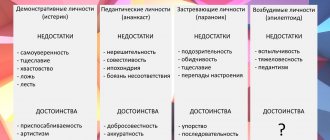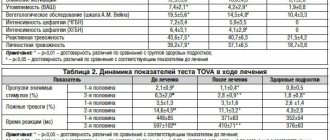German psychiatrist classification
Leonhard determined types of character in psychology by assessing a person’s communication style with the people around him. At the same time, he developed and presented independent types of characters.
- Hyperthymic type. Such people are distinguished by their talkativeness, extreme contact, expressiveness of facial expressions and gestures. A person may regularly deviate from the original topic of conversation in communication; he may constantly have occasional conflicts with people around him due to the fact that he is too frivolous about family and work responsibilities. As a rule, such people themselves become initiators of conflicts. At the same time, they have many positive features that attract partners for communication. This is a thirst for activity, energy, initiative, optimism. Repulsive traits include a tendency to immoral acts, frivolity, and increased irritability.
- Dysthymic type. The person is taciturn, uncommunicative, pessimistic about the surrounding reality, and leads the most secluded lifestyle. At the same time, he values his friends highly and is ready to obey them.
- Cycloid type. He is characterized by regular mood swings, which changes the way he communicates with people around him.
- Excitable type. Such a person is characterized by low contact in communication, slow nonverbal and verbal reactions. Such people are prone to abuse and rudeness, are gloomy and boring, and constantly provoke conflicts.
- Stuck type. These are moderately sociable people, prone to moralizing, and very taciturn. In any business they strive to achieve maximum performance and place increased demands on themselves. Vulnerable and touchy, sensitive to social justice.
- Pedantic type. They practically do not enter into conflicts and generally behave passively. At work they make many claims and demands on others, and behave like bureaucrats.
- Anxious type. People from this group are characterized by timidity and low communication skills. They are predominantly in a depressed mood and feel insecure. They rarely enter into conflicts with others and play an extremely passive role in them.
- Emotive type. Such people prefer to communicate exclusively among a select few. They carry grievances deep within themselves. People around them are attracted by compassion, kindness, and have a heightened sense of duty. At the same time, they are very tearful and sensitive.
- Demonstrative type. These people easily establish contacts with complete strangers, love to be praised, and strive for leadership and power. Demonstrating high adaptability, they are prone to intrigue. At the same time, they irritate those around them with their own self-confidence, boasting, and hypocrisy. They are attracted by their exceptional artistry, courtesy, extraordinary actions and thinking, and are able to captivate others with some idea.
- Exalted type. Amorous and talkative people. They argue constantly, but rarely lead to conflict. They are attentive to friends, altruistic, ready to sympathize and show sincerity. They are repelled by susceptibility to momentary moods and alarmism.
- Extroverted type. These are contact people with a lot of friends and acquaintances. They always have many acquaintances and close friends, they are open to communication and any information. They attract others with their diligence and willingness to listen to another person. Many do not like him because of their frivolity, passion for entertainment, rash actions, and regularly participate in the spread of rumors.
- Introverted type. These are closed people, divorced from reality. They love to be alone. They have strong beliefs about life around them and strict principles. At the same time, they are ready to persistently defend their ideals, even if they are fundamentally wrong and stubborn.
It is worth emphasizing that this classification applies mainly to adults.
Excitable type
They are characterized by increased impulsiveness, low control of their own desires and inclinations, which are often led. Uncontrollable during violent emotional reactions.
They often show irritability and intolerance towards their surroundings and cannot tolerate criticism.
To people with this accentuation, study and work seem neither fun nor attractive. They usually do not set long-term and difficult-to-achieve goals and live in the present.
It is difficult for them to get along in a team due to frequent conflicts. During them, they may show inappropriate emotional reactions, react violently and spend a long time sorting things out.
Types of accentuations
Types of temperament and character accentuation according to Leonard are divided into separate groups.
Temperament
The scientist attributed six types of accentuations to temperament, as a biologically determined formation. Let's talk briefly about each of them.
- Hyperthymic (hypomanic) temperament. Characterized by a predominance of an optimistic mood, a thirst for activity, a focus on success, and sociability. Negativity develops superficiality, an inability to complete a task. There is a violation of ethical standards, a waste of opportunities.
- Dysthymic type (subdepressive). The opposite of hyperthymic. Characterized by an orientation toward failure, pessimism, a serious ethical position, extreme passivity in action, and lethargy.
- Affectively labile type (cyclomic). It is characterized by frequent changes in hyperthymic and dysthymic states.
- Anxious. Characterized by the inability to defend one's point of view in a dispute, fearfulness, timidity, wariness, humility, and a humiliated position. Compensation in the form of feigned self-confidence or even impudent behavior is possible.
- The affectively-exalted type is distinguished by the intensity of experiences, violent emotional reactions, and a tendency to extreme manifestations of feelings (enthusiasm, despair). Easily charged by the mood of others.
- The emotive type is characterized by the ability to deeply feel and empathize. He is distinguished by his impressionability, kindness, and compassion.
Editorial: Can schizophrenia be inherited from parents to children?
Character
Leonhard's character classification is represented by four types.
- Demonstrative (hysterical) type. The peculiarity of accentuation is the hypertrophied tendency to repression. This explains the ability of the hysteric to embellish reality. A person, as it were, enters into the desired image, beginning to believe his fantasies. Thanks to this trait, he easily adapts to his environment, instilling in himself a feeling of love and sympathy for others. The notorious “need for recognition,” as one of the motives of the demonstrative type, is exaggerated. Rather, the passion for self-praise is associated with the ability to repress objective information about oneself. For an ordinary person, if he wants to embellish the real state of things, the brakes are turned on. A hysteric person tends to forget himself, which often leads to rash actions.
- Pedantic character. In contrast to the demonstrative type, the repression mechanism is poorly developed. People with this type of personality are not able to repress doubts or discard unimportant details of the issue, so they can hardly make their choice on any decision. Hence indecision, scrupulousness in work, hypochondria.
- Stuck type. Characterized by the persistence of affective reactions. A penchant for ideas that completely take over a person’s thinking. Stuck affect is most clearly manifested in the case when a person’s personal interests are affected. Affect in these cases turns out to be a response to wounded pride, as well as to various forms of suppression, although objectively the moral damage may be negligible. As a result, the stuck type develops such traits as suspicion, hostility, jealousy, and morbid ambition.
- Excitable type (epileptoid). Characterized by following lower instinctive impulses and ignoring the voice of reason. As a result, impulsiveness, incontinence, demandingness, intolerance, hot temper, and conflict develop.
Extroversion/introversion
Character types according to Leonhard also include extroverted and introverted personality accentuations.
Due to the fact that most psychologists rely on the interpretation of terms according to Eysenck, and psychiatrists - according to Leonhard, such terminological discrepancy creates a problem in finding a common language between specialists.
According to Leonhard, the extroverted personality type is a conformist who does not subject to special analysis information coming from the outside, and therefore easily succumbs to the influence of others. An introvert, on the other hand, does not blindly succumb to the sensations of the present moment, focusing primarily on previous life experiences and his own conclusions. Here, Leonhard’s opinion coincides with the point of view of Carl Jung, who attributed to introverts the traits of thinking types, and to extroverts - ethical (experiencing) types.
Shmishek's technique
G. Shmishek is another psychologist and diagnostician who was able to define and emphasize character types. Shmishek’s classification is practically no different from the typologies of other specialists presented above. The author suggests the following personality types:
- demonstrative;
- stuck; stuck
- pedantic
- excitable;
- hyperthymic;
- dysthymic;
- cyclothymic;
- emotive;
- exalted;
- anxious-fearful.
Emphasizing any character trait forms a certain way of thinking and behavior. In everyday life, under normal conditions, these qualities, as a rule, remain within acceptable limits. Often subtle deviations can only be noticed by people in close proximity. However, stress, shock and other negative factors can have a detrimental effect on a person's mental health. Sometimes, under the influence of such levers, certain accentuations turn into a form of psychopathy and other deviations.
Hyperthymic and cycloid
The hyperthymic type is characteristic of people who are poor strategists, but brilliant tacticians. They are enterprising, resourceful, active, and easily navigate changing circumstances. Due to this, they can significantly improve their social and professional position and move up the career ladder. But at a certain moment they tend to lose their position due to their inability to calculate certain actions in advance; they often make mistakes in people.
People with the hyperthymic type are sociable, active, enterprising, they are always in a good mood, at least in public. Children are restless, active, often play around and play pranks. Teenagers study unstably and have poor discipline. Because of this, conflicts arise with representatives of the older generation. They always have a lot of superficial hobbies, none of which really interests them. In life, they constantly overestimate their capabilities.
Cycloid accentuation is characteristic of apathetic and irritable people. As children, they constantly want to be left alone and do not like to play with their peers. They take any troubles very hard, and in response to any comments they become very irritated, even if they are the most harmless. Adolescents with cycloid accentuation experience dramatic mood changes.
In adulthood, the sharpest edges are smoothed out, but some can get stuck on their complexes, turning into melancholic and depressed individuals. Often their mood depends on the time of year.
Personal level
Additionally, the typology distinguishes 2 types of personality accentuation – extroverted and introverted. Their interpretation by Leonhard does not coincide with the interpretation by other scientists (Eysenck).
Extroverts easily fall under the influence of others and change their minds. They easily adapt to changed circumstances, successfully communicate with new acquaintances, and effectively master new information.
Introverts tend to draw on their own experiences. They are so immersed in their inner world that they are detached from reality and are not influenced by life circumstances. They tend to reason and philosophize more than to act. This type of personality does not allow interference in their life and defends their own views and principles. K. Leonhard considers introverts to be more strong-willed individuals.
What is a stuck personality type?
Getting stuck in psychology is a mental state in which a person lingers on some feeling or event for a long time.
Additional Information. The following expressions are considered popular synonyms for this phenomenon: “sticky state” and “lingering character.”
Most often, such behavior is observed in affectively stagnant people of the paranoid type of accentuation. The stuck type of personality represents such an accentuation of character, which is characterized by excessive stability of affect.
Stuck-type thoughts are destructive for the individual himself.
Additional Information. Whatever emotions a person experiences, they should subside over time. After all, a discharge has occurred, negative or positive feelings have come out.
For people with the stuck type, this process proceeds differently: after a while, the affect does not end. As soon as a person mentally returns to the situation, emotions begin to rage again.
Concept
The concept of “accented personality” was introduced by the German psychiatrist and psychopathologist Karl Leonhard. His classification of personalities had much in common with the concept of “latent psychopathy,” previously proposed by the Soviet scientist Pyotr Gannushkin. However, it was developed by Leonhard into an independent theory.
From the editor: What to do if you have a fracture of the base of the skull
The scientist presented his thoughts on character typology in his work “Accented Personalities.” The first part of the monograph provides a classification and analysis of various accentuations; in the second, accentuated types are examined using the example of heroes from classical works of world literature.
At first glance, character accentuations according to Leonhard are similar to personality disorders, which leads to the assumption that there is a connection between them. However, the scientist only sought to identify those personality traits that bring difficulties to their owners in life. When describing accentuations, Leonhard turned to the negative manifestations of certain character traits in an extreme, most pronounced form. Therefore, his characterization of psychological types is perceived as an illustration of human shortcomings and painful patterns of behavior. However, accentuations according to Leonhard are still a manifestation of the clinical norm, albeit in a more acute form, and therefore cannot be used as a psychiatric diagnosis.
Psychologists and psychotherapists around the world are actively interested in issues of accentuation, since the disproportionate development of certain personality traits creates conditions for the formation of corresponding mental or psychosomatic disorders.
In Russian psychology, Leonhard’s typology was developed and supplemented by the scientist Andrei Lichko, who changed the original term “accentuated personality” to “accentuation of character.” After all, an accentuated personality, according to the Soviet psychiatrist, is too complex a concept, more consistent with the idea of psychopathy.
Correspondence table of accentuations according to Leonhard and Lichko.
| No. | K. Leongard (questionnaire by H. Smishek) | A.E.Lichko (PDO questionnaire) |
| 1. | – | Astheno-neurotic |
| 2. | Dysthymic | – |
| 3. | Demonstrative | Hysterical |
| 4. | – | Unstable |
| 5. | Stuck | – |
| 6. | Pedantic | Psychasthenic |
| 7. | – | Schizoid |
| 8. | Hyperthymic | Hyperthymic |
| 9. | – | – |
| 10. | Excitable | Epileptoid |
| 11. | Anxious-fearful | Sensitive |
| 12. | Cyclothymic | Cycloid |
| 13. | Affectively exalted | Labile hysteroid |
| 14. | Emotive | Labile |
| 15. | – | Conformal |
| Total | 10 | 12 |
Prospects for the study of accentuations
Character accentuations according to Leonhard suggest the possibility of forming both a socially successful personality and the negative development of characterological characteristics
Therefore, taking into account accentuation, you can achieve more effective work, social fulfillment, and avoid many psychosomatic diseases
In this regard, the doctrine of accentuations can be useful:
- HR managers
- teachers,
- psychologists,
- managers of enterprises of various directions,
- to all parents,
- medical workers.
By understanding the characteristics of accentuation, it becomes possible to choose the most suitable profession or field of activity. For example, a demonstrative personality would be perfectly suited to work in the theatre, a profession that requires communication with a large number of people, perhaps even teaching, but monotonous office or research work would not be suitable. At the same time, a stuck person can cope well with the latter.
Typology according to Leonard
The scientist identified 10 accentuated types:
Demonstrative. This is a self-confident and vain individual, for whom his own personality is of greatest value. The people around you are not interested. In order to impress, he is ready to resort to flattery, lies and boasting.
Emotive. A weak personality, distinguished by kindness and compassion for others. Due to excessive fearfulness and sensitivity, an individual often does not risk taking responsibility, making decisions, or refusing someone’s request. Emotions and feelings come first for him. Hyperthymic. The hyperthymic type of accentuation is characteristic of success-oriented people. They strive to be active and achieve the desired results. They are distinguished by optimism, a positive outlook on life, and faith in luck. For such people, new emotions and experiences that bring pleasure are of great importance.
Dysthymic. This is the complete opposite of the previous character. The dysthymic type of accentuation is otherwise called hypothymic. Such people are always serious and initially focused on failure. They are often depressed. When starting a new business or finding yourself in unfamiliar circumstances, they experience anxiety and apprehension. Behavior is somewhat retarded.
Labile. Characterized by extreme mood swings. A person switches with lightning speed from one emotional experience to another. Labile psyche is characterized by increased sensitivity to signs of attention. The individual is oriented towards various standards, the loss of closeness with which becomes a real test.
Anxious. There is excessive suspiciousness and concern. A person is constantly afraid that something bad might happen. When communicating with others, he is timid and shy. Any failure is experienced very acutely. In the future, the fear of making a similar mistake again is formed.
Exalted. Emotions are elevated to a cult. Such individuals experience real jubilation from ordinary positive events or become depressed due to minor problems. Any emotion in this type is expressed much more clearly than in any other. An exalted (or affectively exalted) type of character is often characteristic of representatives of creative professions, who are distinguished by amorousness, sociability, and impressionability. All this is manifested in active gestures, rich facial expressions, rapid actions, etc.
Pedantic. Great importance is attached to preliminary consideration of actions and situations. Excessive indecisiveness leads to an overly responsible approach to any problems, both in personal and professional life. Any changes in usual circumstances are a source of stress due to increased rigidity of thinking.
Stuck. Individuals with a similar mental feature can be “stuck” in one negative emotional state for a long time. The impact is especially serious in situations where their personal feelings are hurt. Such people never forget the insults inflicted on them, so they often enter into conflicts.
Excitable. The main feature is hot temper. It is difficult for a person to control his own thoughts and behavior. If he is in a state of excitement, he is unable to control himself
In behavior, rationality gives way to instinctiveness: no rational arguments are taken into account due to the desire to release emotions or satisfy a momentary need.
Additional two types relate to the personal level: extroverted (focus on the surrounding reality, active interaction with it), introverted (the main attention is paid to one’s internal state, and the external environment is ignored as much as possible)
From the editor: Seasonal exacerbation of VSD
The line between normality and pathology
Trying to independently assess the degree of their own or someone else’s adequacy, people often wonder where the line between normal and pathological psyche and behavior lies. Various accentuations of character are defined as an extreme degree of clinical norm on the border with pathology. In the second half of the last century, namely in 1968, the German psychiatrist K. Leonhard introduced the concept of “accentuation”. He defined it as abnormal, overly enhanced individual personality traits.
Nine years later, in 1977, the Soviet scientist A.E. Lichko proposed using a more precise and narrow term “character accentuation.” It was these two scientists (K. Leongrad and A. E. Lichko) who made an invaluable contribution to the science of psychology, developing close, complementary concepts and classifications of accentuations.
Excessive emphasis and sharpness of certain character traits is perceived by a person and his environment as a kind of psychological problem that interferes with life, and therefore is mistakenly classified as a mental disorder.
- Influence on a certain area of life. Accentuation manifests itself in specific stressful and crisis situations affecting one area of life. Personality disorder affects all areas of a person's life.
- Temporality. Character accentuation most often manifests itself in adolescents and occasionally in adulthood. Serious mental disorders develop and tend to intensify later in an individual's life.
- Short duration of social maladaptation or its complete absence. Social maladjustment is a partial or complete loss by an individual of the ability to adapt to the conditions of the social environment. Accentuation, unlike a personality disorder, does not prevent a person from adapting to society and being a full member of it, or “unsettles” it for a short time.
- Accentuation of character can serve as an impetus for the formation of psychopathy only when the traumatic factors and impact are too strong and prolonged. Also, such a negative impact can provoke acute emotional reactions and nervousness.
What should be understood by character accentuation
Characterological personality traits, depending on the situation, can develop in both a positive and negative direction, and can reach an extreme version of the norm, bordering on psychopathy. That is, accentuation is like a bridge between normality and pathology. Based on the degree of severity, accentuation can be hidden or obvious. People with such traits are called accentuated.
It is necessary to distinguish between accentuation and psychopathy. Psychopathy is a character pathology. A person cannot adequately adapt to the social environment; disharmony of character, temperament and behavior occurs. He cannot cope with life's difficulties, this causes severe neuropsychic stress, from which he suffers and the people around him suffer.
The classification of character accentuation is quite complex. The best known are the studies of K. Leonhard and A. Lichko; they seem to complement each other. I offer you the classification of a domestic psychiatrist, Doctor of Medical Sciences, Professor Alexander Evgenievich Lichko (1926 - 1994), which is used by specialists in psychological diagnostics.
Conformal, psychasthenic and paranoid types
Minors of the conformist type do not have their own opinions, they are not critical of themselves, and lack initiative. They are very easy to subordinate to some authority or group of people. The life attitude of most of them in any situation can be characterized by the words “be like everyone else.” At the same time, they are very conservative and prone to moralizing. To protect their interests, they are even ready to commit very unseemly acts, for which they find explanation and justification.
Adolescents of the psychasthenic type are prone to deep introspection, reflection, and assessment of the behavior of the people around them. In terms of their intellectual development, they are ahead of their peers; their indecision is combined with peremptory views and judgments, and self-confidence. When they need attentiveness and discretion, they are often prone to impulsive actions. With age, representatives of the psychasthenic type experience little change. This often ends in drug or alcohol use. In relationships, they are petty and despotic, this prevents them from normal communication with people around them.
It is interesting that the paranoid type is not always included in Lichko’s classification. The fact is that its main manifestations appear only after 30, or even 40 years. In adolescence and especially childhood, its representatives are usually classified as schizoid or epileptoid accentuation. In adulthood, inflated self-esteem and the idea of one’s own exclusivity begin to come to the fore. They differ from delusional ideas only in that others perceive them as quite real, albeit unreasonably exaggerated.
Features of the stuck type of personality accentuation
Cognitive personality disorders - what does it mean?
The affective-stagnant personality type, which is characterized by being stuck, has a number of features. Among them are the following paranoid manifestations:
- Touchiness is a striking feature of people with a stuck type of accentuation.
- Grudge. A person is capable of being “stuck” for a long time in the grievances inflicted on him.
- Conflict. Representatives of the paranoid type will not miss the opportunity to enter into a quarrel with the offender at any opportunity.
- Affectively stagnant individuals endure the ups and downs that life provides for a long time. It is difficult for them to get rid of mental torment.
- There is a clear division between friends and enemies. In this case, people can quickly fall from a positive group to a negative one.
- Due to excessive suspicion, thoughts of unfair treatment are often generated in the head of a stuck person. In fact, these can only be speculations that have nothing to do with reality.
- The thinking of such people is immature, childish, prone to fantasy.
- In the love sphere, affectively stagnant individuals are pathologically jealous.
- Often people with a stuck type of accentuation have increased demands on themselves and others.
- Positive character traits include endurance, ambition and perseverance. These traits help people of this type achieve high results in the professional field.
Due to the constant increase in affect, a person can experience both long-term defeats in creative and work activities, and outstanding successes.
Constant swing of ups and downs
Important! Due to the continuous change of falls and satisfaction, people with a stuck type of accentuation develop a paranoid affect.
If the persistence of thoughts is too long, a person may develop overvalued or delusional ideas.
Unstable, emotionally labile and epileptoid types
Teenagers with unstable personality types constantly gravitate towards idleness and entertainment. They have no life goals and interests in life; they care little about the future. In most cases, those around them characterize them as people going with the flow.
Children with an emotionally labile personality type are characterized by strong and regular mood swings, and their behavior is unpredictable for others. It is noteworthy that any little things can become the reason for such mood changes. For example, an unfriendly phrase or a sidelong glance. When they are in a bad mood, adolescents with an emotionally labile personality type feel the need for support from loved ones. They feel well how others treat them.
At an early age, representatives of the epileptoid type are very tearful. But when they grow up, they themselves begin to offend the little ones, preferring to mock those who are not able to fight back. They are characterized by cruelty, power and pride. In the society of other children, they strive not just to become leaders, but real rulers. In groups that take control, they establish the most rigid, sometimes even autocratic, orders. They are able to please management and often occupy influential positions due to this.
Character traits
Among the features of personality manifestations, it is customary to distinguish between general (global) and private (local) properties. The influence of general qualities covers a huge area of behavior. Some psychologists (A.G. Shmelev, W. Norman) identified the main global character traits. They presented pairs of opposite traits as follows:
- arrogance - indecisiveness;
- benevolence - hostility;
- awareness - impulsiveness;
- poise - concern;
- flexibility of intellect - stubbornness.
Private manifestations include more specific character traits. They also have a significant impact on a person and his relationships with others.
These include the following signs:
- openness - closedness;
- leadership - dependence;
- romance - practicality;
- ambition - modesty;
- delicacy - unceremoniousness;
- originality - stereotyping;
- anxiety - serenity;
- independence - conformism (adaptability, susceptibility to other people's influence).








